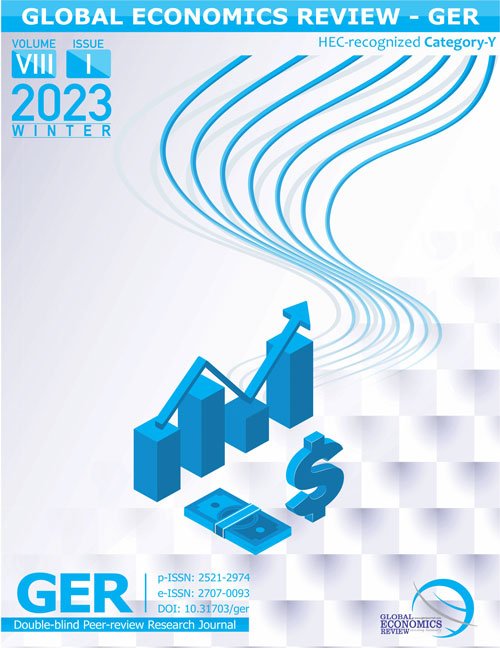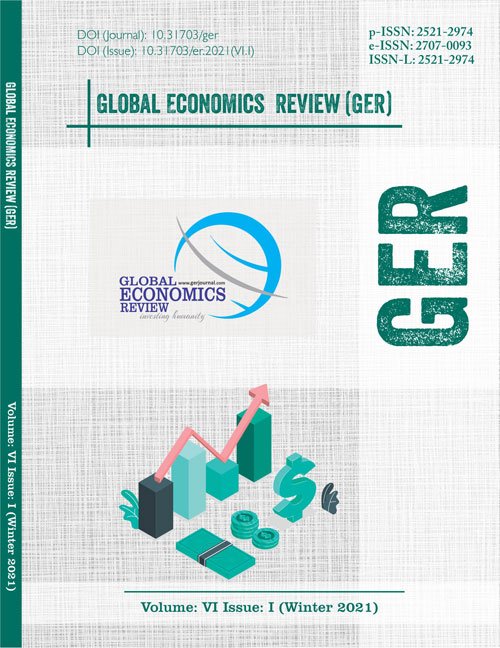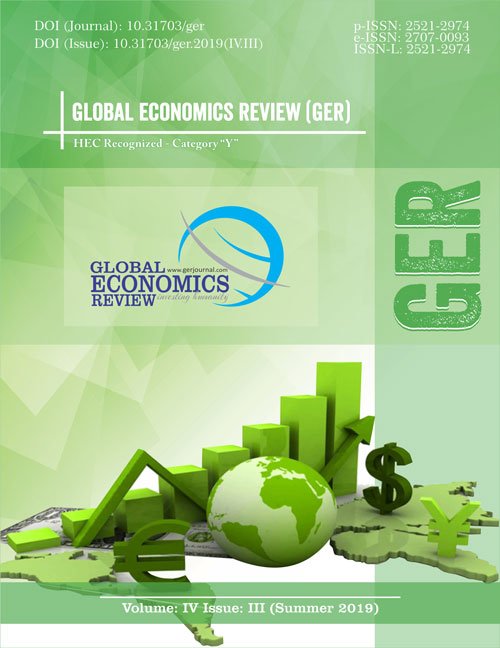01 - CSRs Knowledge and Management of Corporate Social Responsibility in Pakistan
http://dx.doi.org/10.31703/ger.2017(II-I).0110.31703/ger.2017(II-I).01 Published : Dec 2017
-
The aim of the study is to collect first-hand information from the corporate practitioners regarding the “why” “how” “when” and “where” of corporate social responsibility (CSR hereafter) by conducting an interview session with the companies listed on the Pakistan Stock exchange. It was observed that the involvement in CSR is beneficial for firm perfo... Details
-
CSR, Corporate Environment, Pakistan, Institutional Forces, Firm's Resources
-
(1) Maqsood Hayat
Yunnan University of Finance and Economics, Kunming, China.
(2) Shehzad Khan
Institute of Business Studies and Leadership,Abdul Wali Khan University, Mardan, Kp, Pakistan.
(3) Asif Iqbal
College of Management,Ocean University of China, Qingdao, China.
02 - Operations Strategy Practices of SMEs
http://dx.doi.org/10.31703/ger.2017(II-I).0210.31703/ger.2017(II-I).02 Published : Dec 2017
-
There is a close link between operations strategies and firm performance. Thus, it is paramount to find out what competitive priorities are adhered to by small and medium enterprises when it comes to operational decision making. The sample is drawn from 244 manufacturing small and medium enterprises (SMEs) operational in Khyber Pakhtunkhwa (KP), Pakistan. Consistent with the research objective, Ex... Details
-
Competitive strategies, SMEs, Pakistan
-
(1) Fazal Haleem
PhD Scholar, Institute of Business Studies and Leadership,Abdul Wali Khan University Mardan, KP, Pakistan.
(2) Muhammad Jehangir
Associate Professor,Institute of Business Studies and Leadership,Abdul Wali Khan University Mardan, KP, Pakistan.
(3) Asia Baig
Demonstrator, Department of Economics, Abdul Wali Khan University, Mardan, KP, Pakistan.
03 - CPEC, A Game Changer but whose: An Economic Reality Check
http://dx.doi.org/10.31703/ger.2017(II-I).0310.31703/ger.2017(II-I).03 Published : Dec 2017
-
You will arrive at a destination after 10, 20 or 30 years from now, but where? Thats is the critical inquiry/question. And the answer could be of two-fold; a well-defined destination, or an ill-defined (chaotic) destination. Its obvious, that definitely everyone would like to arrive at a well-defined one. The same rule applies to the mega project of CPEC. No doubt, CPEC is a great and mega project... Details
-
CEPC, Strategic Viability, Economic Viability, Security Perspective, Challenges.
-
(1) Muhammad Zia-ur Rehman
Assistant professor, National Defence University, Islamabad, Pakistan.
(2) Yasmine Muhammad Javaid Iqbal
Faculty of Contemporary Studies, National Defence University, Islamabad, Pakistan.
(3) Muhammad Shoaib Malik
Assistant Professor, Department of Pakistan Studies, National University of Modern Languages Islamabad, Pakistan.
04 - The Role of Public Spending and Credit Disbursement in the Agriculture Sector of
http://dx.doi.org/10.31703/ger.2017(II-I).0410.31703/ger.2017(II-I).04 Published : Dec 2017
-
The current study explores the role of public spending and credit disbursement in the agricultural production of Pakistan during the period 2000 to 2016. In this study, Agriculture Production Growth (APG) is the dependent variable while real GDP, government expenditure, labor force participation and agricultural credit are the independent variables. The stationarity of the data has been investigat... Details
-
Government Expenditure, Agricultural Production, Ordinary Least Squares, ADF Test
-
(1) Sumbal Javed
BS Economics, Department of Economics,Abdul Wali Khan University Mardan, KP, Pakistan.
(2) Muhammad Tariq
Assistant Professor, Faculty of Business & Economics,Abdul Wali Khan University Mardan, Mardan, KP, pakistan.
(3) Saima Urooge
Assistant Professor, Islamia College University, Peshawar, KP, Pakistan.
05 - Energy Crisis and Comparative Advantage Industries: Empirical Evidence from the
http://dx.doi.org/10.31703/ger.2017(II-I).0510.31703/ger.2017(II-I).05 Published : Dec 2017
-
The core purpose of the study is to analyze the effects of the energy problems on the competitiveness and performance of major selected Pakistani industries. The data used for the study is from the years 1999 to 2015. The industries used in the research are Leather, Textile, Tobacco, Pharmaceutical, and Sugar. The Balassa Index is firstly used to compute the competitiveness of the above-mentioned ... Details
-
Energy Crisis, Comparative Advantage Industries, Net returns
-
(1) Malik Saqib Ali
Assistant Professor,Department of Economic, National University of Modern Languages Islamabad, Pakistan.
(2) Sana Zaigham
Visiting Faculty member, Department of Commerce, Federal Urdu University of Arts and Sciences, Islamabad, Pakistan.
06 - Capitalism in the 21st Century: A Marxist Perspective
http://dx.doi.org/10.31703/ger.2017(II-I).0610.31703/ger.2017(II-I).06 Published : Dec 2017
-
A Marxist understanding of the ills of capitalism is applicable to 21st -century capitalism. Motivated by surpluses, capitalism become global in its endeavour of outsourcing production and capital labour substitution. As a result, the capitalist core established an exploitative relationship with the developing and under-developed third world countries. In order to protect their interests and to ke... Details
-
Marxism, Capitalism, Outsourcing, Surpluses, Mode of production, Hegemony
-
(1) Saima Gul
Lecturer,Department of International Relations,University of Peshawar, KP, Pakistan.
(2) Syed Sabir Muhammad
PhD. Scholar, Department of International Relations,University of Peshawar, KP, Pakistan.
(3) Ahmad Ali
Lecturer, Political Sciences, Higher Education Department,Khyber Pakhtunkhwa, Pakistan.
07 - China, Pakistan Extended Relation: An Overview of CPEC Opportunities, Expectatio
http://dx.doi.org/10.31703/ger.2017(II-I).0710.31703/ger.2017(II-I).07 Published : Dec 2017
-
Since the beginning of diplomatic ties in 1951, China-Pakistan has enjoyed long-lasting, stable and friendly relations and considered to be an irreplaceable "all-weather friend" as well. In any hard and troubled time, both countries support each other. Pakistan could have got more benefit from China in the last several decades; however, the CPEC under China's "BRI" provides a very shining opportun... Details
-
OBOR, BRI, CPEC, Geopolitics, Gwadar, Pivot of Asia, Strait of Malacca.
-
(1) Allauddin
PhD Scholar,School of International Relations and Public Affairs, Shanghai International Studies University, Shanghai PR China.
(2) Muhammadi
PhD Scholar, School of International Relations and Public Affairs,Shanghai International Studies University, Shanghai PR china.
08 - Indian Strategic Economic Tactics and Emergent Challenges for the Developing Cou
http://dx.doi.org/10.31703/ger.2017(II-I).0810.31703/ger.2017(II-I).08 Published : Dec 2017
-
In this paper, we examine the neighborhood especially Indian strategies for the region. The political philosophies and regional strategies related to developing economies in the region need synergy and strategically positive and constructive in nature. Their philosophy to rule and their foreign policy is different from all the other leadership. Indian Current Ruling Party seems involved in differe... Details
-
Indian Current Ruling Party's Negativity, India, Muslims, Pakistan, Indian Current Ruling Party's Relation with Neighboring Countries.
-
(1) Shahid Iqbal
Independent Research Fellow, Islamabad.
(2) Jan Alam
MPhil Scholar, Department of Political Science, Abdul Wali Khan University Mardan, Mardan, KP, Pakistan.
(3) Muhammad Zia-ur Rehman
Assistant Professor, National Defence University, Islamabad, Pakistan.
09 - A Statistical Investigation of Business Cycles Characteristics in Pakistan
http://dx.doi.org/10.31703/ger.2017(II-I).0910.31703/ger.2017(II-I).09 Published : Dec 2017
-
This study investigates the business cycle characteristics for Pakistan using three sets of variables namely expenditure components of GDP, nominal variables and real variables. The findings reveal that the volatility of expenditure components are greater than GDP during the full sample of 1973 to 2015. Whereas, in the Pre-SAP and Post-SAP periods i.e. 1973-1988 and 1989-2015, real variables and n... Details
-
Business Cycles, GARCH, Volatility, SAP
-
(1) Niaz Ali
MS Economics, Department of Economics, Abdul Wali Khan University Mardan, KP, Pakistan
(2) Muhammad Tariq
Assistant Professor,Faculty of Business & Economics,Abdul Wali Khan University Mardan, Mardan, KP, Pakistan.
(3) Asia Baig
Demonstrator, Department of Economics, Abdul Wali Khan University, Mardan, KP, Pakistan.
10 - Evaluation of Financial Management Competencies of School Principals and their I
http://dx.doi.org/10.31703/ger.2017(II-I).1010.31703/ger.2017(II-I).10 Published : Dec 2017
-
The study aimed at finding the impacts of secondary school principals financial management competency on the institutional development. All male and female principals of secondary and higher secondary schools of Khyber Pakhtunkhwa were the population of the study and among them a sample of 200 head teachers including 100 male (40 urban & 60 rural) and 100 females (40 urban & 60 rural) from... Details
-
Financial Management Competencies, School Principals & Institutional Development
-
(1) M. Anees-ul-Husnain Shah
Assistant Professor, Department of Education, University of Education DG Khan Campus, Punjab, Pakistan.
(2) Asghar Ali
Assistant Professor, Faculty of Education, University of Malakand, Chakdara, KP, Pakistan.
(3) M. Adnan Maqbool
PhD Scholar, Department of I.E.R, University of the Punjab, Lahore, Pakistan.
11 - Development of the United Nations Climate Change Regime and its Socio-economic I
http://dx.doi.org/10.31703/ger.2017(II-I).1110.31703/ger.2017(II-I).11 Published : Dec 2017
-
The United Nations Climate Change Regime, planned in 1992, and formally established in 1994 through the inauguration of the United Nations Framework Convention on Climate Change (UNFCCC), under its mandate to address climate change at the global level, provides a great deal of support to maintain global climate control through different institutions in the capacity building of developing states in... Details
-
Agriculture, Climate Change, Economy, Kyoto Protocol Pakistan, UNFCCC, United Nations
-
(1) Muhammad Mubeen
Assistant Professor, Department of Humanities, COMSATS Institute of Information Technology, Islamabad, Pakistan.
(2) Muhammad Qasim Basharat
MS International Relations Candidate, COMSATS Institute of Information Technology, Islamabad, Pakistan.
(3) Sohail Ahmad
Assistant Professor, Department of Humanities, COMSATS Institute of Information Technology, Islamabad, Pakistan.
12 - Revisiting the Political Economy of the State to Society Relation during Mubara
http://dx.doi.org/10.31703/ger.2017(II-I).1210.31703/ger.2017(II-I).12 Published : Dec 2017
-
This study revisits the political economy of the Mubarak Regime and his downfall byengaging with the existing literature, which dwells on political, economic,administrative, legal, and constitutional methods of maintaining hegemony and regimessurvival. This paper revisits and combines them into a single framework and argues thatstate structure and society remained fundamentally disconnected from e... Details
-
Infitah, Egypt, Structural Adjustment Program, Civil Society, Revolution, IMF, World Bank, Military Industrial Complex, Privatization, Terrorism, Muslim Brotherhood
-
(1) Abdul Shakoor
Assistant Professor, Department of International Relations, Abdul Wali Khan University Mardan, KP, Pakistan.
(2) Sajjad Ali Khan
Assistant Professor, Department of International Relations, Abdul Wali Khan University Mardan, KP, Pakistan.
(3) Tahir Ahmad
Lecturer, Department of International Relations, Abdul Wali Khan University Mardan, KP, Pakistan.
13 - An Analysis of the Judicial Enforcement of Social and Economic Rights
http://dx.doi.org/10.31703/ger.2017(II-I).1310.31703/ger.2017(II-I).13 Published : Dec 2017
-
The modern concept of human rights can be traced back to the European Renaissance. However, it was only after the foundation of the United Nations Organization that practical steps toward global recognition and enforcement could become possible. The Universal Declaration of Human Rights (UDHR) is a unique document in the sense that never before in the history of mankind, nations did agree on unive... Details
-
Constitutional Law, Socio-Economic Rights, International Covenant on Social Economic and Cultural Rights, Judicial Enforcement of Socio- economic Rights
-
(1) Naghma Farid
Nawab Allah Nawaz Khan Law College, Gomal University, Dera Ismail Khan, KP, Pakistan.
(2) Muhammad Siraj Khan
Nawab Allah Nawaz Khan Law College, Gomal University, Dera Ismail Khan, KP, Pakistan.
(3) Kashif Saleem
Department of Management Sciences, Qurtuba University, Dera Ismail Khan, KP, Pakistan.
14 - The Nexus between Economic Growth, Poverty Reduction and Income Inequality in th
http://dx.doi.org/10.31703/ger.2017(II-I).1410.31703/ger.2017(II-I).14 Published : Dec 2017
-
This article attempts to examine the relationship between economic growth and poverty reduction through an analysis of the effects of remarkable growth performance of three East Asian countries viz China, Korea and Taiwan on poverty reduction. Through an extensive review of literature, it was found that the level of poverty as well as income inequality in China has remained high for most of the ti... Details
-
East Asian Miracle, Economic Growth, Development, Poverty Reduction, Income Inequality, China, Taiwan, Korea
-
(1) Sajjad Ali Khan
Assistant Professor, Department of International Relations, Abdul Wali Khan University Mardan, Mardan, KP, Pakistan.

 Volume X, Issue II (Spring 2025)
Volume X, Issue II (Spring 2025)  Volume IX, Issue III (Summer 2024)
Volume IX, Issue III (Summer 2024)  Volume IX, Issue II (Spring 2024)
Volume IX, Issue II (Spring 2024)  Volume IX, Issue I (Winter 2024)
Volume IX, Issue I (Winter 2024)  Volume VIII, Issue IV (Fall 2023)
Volume VIII, Issue IV (Fall 2023)  Volume VIII, Issue III (Summer 2023)
Volume VIII, Issue III (Summer 2023)  Volume VIII, Issue II (Spring 2023)
Volume VIII, Issue II (Spring 2023)  Volume VIII, Issue I (Winter 2023)
Volume VIII, Issue I (Winter 2023)  Volume VII, Issue IV (Fall 2022)
Volume VII, Issue IV (Fall 2022)  Volume VII, Issue III (Summer 2022)
Volume VII, Issue III (Summer 2022)  Volume VII, Issue II (Spring 2022)
Volume VII, Issue II (Spring 2022)  Volume VII, Issue I (Winter 2022)
Volume VII, Issue I (Winter 2022)  Volume VI, Issue IV (Fall 2021)
Volume VI, Issue IV (Fall 2021)  Volume VI, Issue III (Summer 2021)
Volume VI, Issue III (Summer 2021)  Volume VI, Issue II (Spring 2021)
Volume VI, Issue II (Spring 2021)  Volume VI, Issue I (Winter 2021)
Volume VI, Issue I (Winter 2021)  Volume V, Issue IV (Fall 2020)
Volume V, Issue IV (Fall 2020)  Volume V, Issue III (Summer 2020)
Volume V, Issue III (Summer 2020)  Volume V, Issue II (Spring 2020)
Volume V, Issue II (Spring 2020)  Volume V, Issue I (Winter 2020)
Volume V, Issue I (Winter 2020)  Volume IV, Issue IV (Fall 2019)
Volume IV, Issue IV (Fall 2019)  Volume IV, Issue III (Summer 2019)
Volume IV, Issue III (Summer 2019)  Volume IV, Issue II (Spring 2019)
Volume IV, Issue II (Spring 2019)  Volume IV, Issue I (Winter 2019)
Volume IV, Issue I (Winter 2019)  Volume III, Issue II (Fall 2018)
Volume III, Issue II (Fall 2018)  Volume III, Issue I (Spring 2018)
Volume III, Issue I (Spring 2018)  Volume II, Issue I (Fall 2017)
Volume II, Issue I (Fall 2017)  Volume I, Issue I (Fall 2016)
Volume I, Issue I (Fall 2016)